By Jekhan Aruliah
Despite the Jaffna district having the second highest Literacy Rate in Sri Lanka, it does badly on employment and dismally on incomes. What's up?
I have heard it said here in Sri Lanka and abroad that unemployment is high in Jaffna because so many people don't need to work. It is asserted that they live on free money, remittances sent by friends and family from overseas.
It may or may not be true that lots of people are idling away funded by parachuted dollars and pounds. But that is not the reason the unemployment nor underemployment rate is high. The Sri Lankan Department of Census and Statistics only counts people who actually want a job as Unemployed or Underemployed:
Unemployed: " Persons available and/or looking for work, and who did not work and taken steps to find a job during last four weeks and ready to accept a job given a work opportunity within next two weeks are said to be unemployed."
Underemployed: "if the person has worked less than the normal duration in his/her main & secondary activities, then the person is further questioned to ascertain whether he/she is prepared and available for further work if provided. Such persons are considered underemployed in their respective employment."
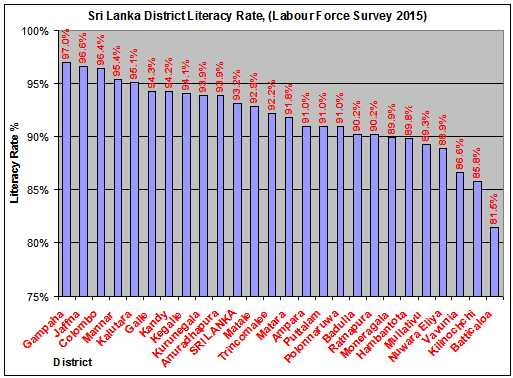
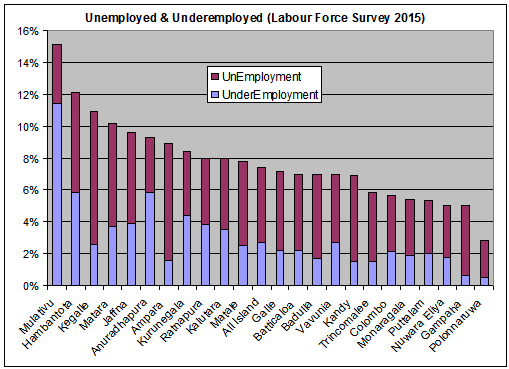
Dollar-fuelled layabouts zipping around on shiny new scooters sucking on spliffs with no desire for a job are not included in the Unemployment nor Underemployment figures. However they do contribute to Jaffna having the lowest Labour Participation Rate: i.e. the lowest percentage of the working age population actually working for a living or looking for a job. Well meant foreign funds are said to be creating an unhealthy dependency culture among young people who should instead be launching themselves into independent and productive adulthood.
Doubtless some of those remittance from the Diaspora could be better targeted investing in those able-bodied beneficiaries' skills, not just going to pay their living expenses. Investing in the people by funding cookery, plumbing, bricklaying, driving and other courses that could lead them out of dependency into productive careers. The "
Provincial Vocational Education and Training (VET) Plan, 2014-18" states:
"While on average 71,000 skilled labourers (in variety of skills in all the sectors of the economy) are required annually in the Northern Province in the next four years, only about 7,500 persons completed vocational courses in the north during 2012."
Coming back to the high literacy linked to high unemployment. You might think having a better education would mean a better chance at a job. The data shows for the whole of Sri Lanka, not just in the North, the opposite is true. The unemployment rate goes up the further up the educational tree you climb. (Source:
Labour Force Survey, 2015)
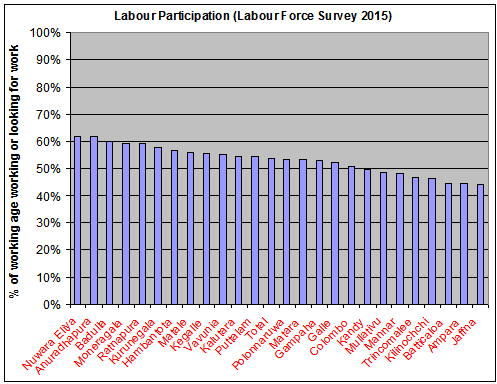
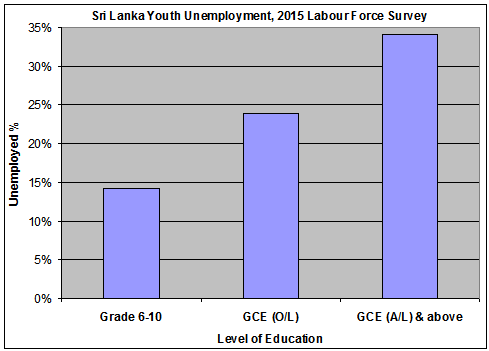
This is not to say your employment prospects are improved by skipping school. While the less educated have much lower unemployment, they tend to end up in much less desirable 'informal' jobs with low pay, low benefits, low protection, and low status. The same Labour Force Survey shows that for a job in the formal sector, working for the government and for established companies, you are far better off with a good education. (Source: Labour Force Survey, 2015)
The problem across Sri Lanka, not just in the North, is not that people are too educated to be employed. The problem is our national economy is not creating enough good jobs for all those educated people. And is not creating enough attractive jobs to tempt the able-idle back to work thereby raising the Labour Participation rate and thence raising our national wealth.
While the unemployed-educated are an island-wide issue, what is a particularly Jaffna problem is the abysmal incomes in the district. Illustrated by the "
Household and Incomes Survey - 2012/13"* by the Ministry of Finance, which gives estimates of the median (average) income for income receivers.
Income Receiver: " If a person is less than 10 years old or a person’s total monthly income is less than Rs. 250, then that person is not defined as an income receiver in the HIES and such income values are added to income of head of the respective household."
[*This is the most recent available from the Department of Census and Statistics, which conducts this survey every 5 years].
As this figure is specifically for "income receivers" (i.e. excludes people who don't receive an income, like children) it is a good indication of what the poorer people are paid in wages and handouts as they are unlikely to receive much investment income from their asset portfolios. The definition of 'median' means 50% of income receivers are receiving less than this amount.
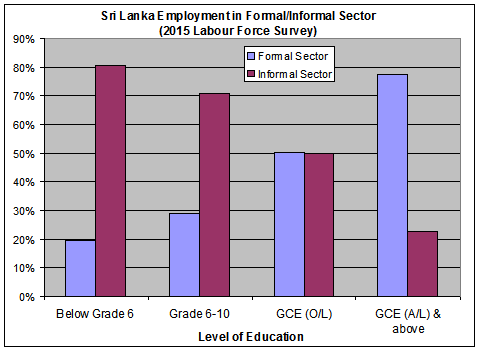
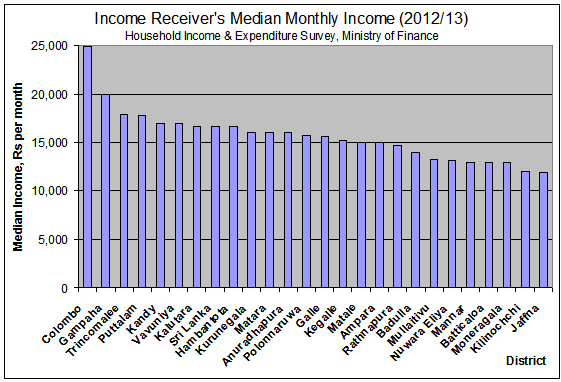
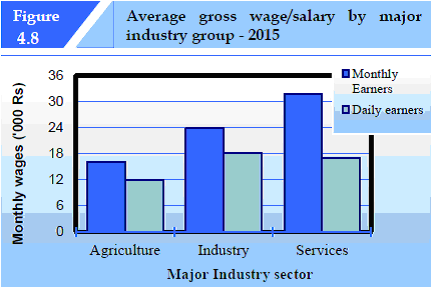
In Jaffna, for 2012/13, half of income receivers got less than Rs11,896/= per month. This figure for Jaffna, the second most highly literate of all districts, is the lowest in the whole of Sri Lanka!
In Sri Lanka the lowest average incomes are in the Agricultural sector. To improve incomes people need to have many more opportunities to move out of farming into factories and into offices.
Before the war the Government operated 38 major manufacturing industries in the Northern Province of which only 7 remain (figures from the
2015 statistical report from the Northern Provincial Council). The Private Sector is hardly doing any better, with just a handful opening anything more than sales outlets.
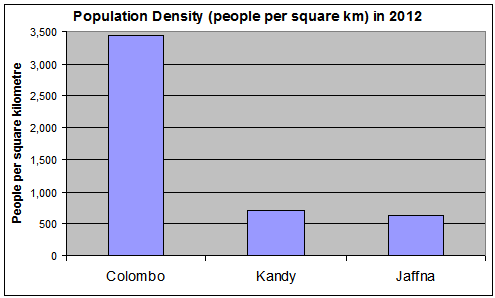
Jaffna has a literate cheap workforce. This should be tempting for employers. Apart from all these low cost readers and writers, Jaffna also has a low population density, very affordable housing, and good schools. As well as a state-of-the-art cinema, the Colonel's finger-lickin fried chicken, and delicious ice cream. Or a great freshly cooked dosa and sambar breakfast for Rs70 including tea, if you prefer that kind of thing and you know where to go.
Not to mention largely uncrowded roads. If you regularly find yourself cursing in a Colombo/London/Chicago traffic jam trying to get home after a hard day's work, why don't you move your office to Jaffna?
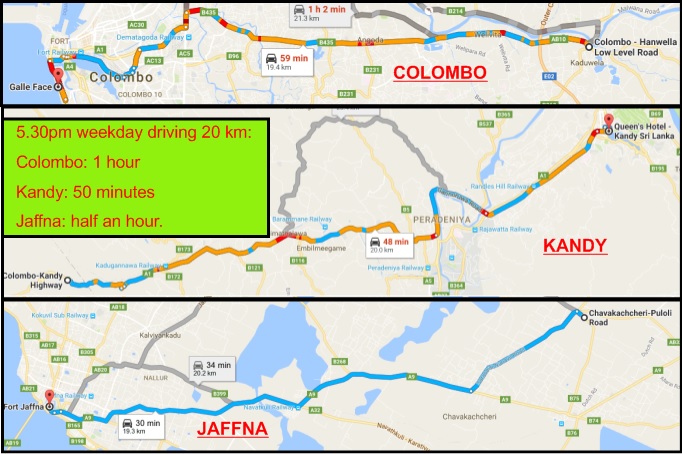
( — The writer Jekhan Aruliah was born in Sri Lanka and moved with his family to the UK when he was two years of age. Brought up in London, he graduated from Cambridge University in 1986 with a degree in Natural Sciences.
Jekhan then spent over two decades in the IT industry, for half of which he was managing offshore software development for British companies in Colombo and in Gurgaon (India). In 2015 Jekhan decided to move to Jaffna where he is now involved in social and economic projects. He can be contacted at jekhanaruliah@gmail.com — )
Save 
 Dollar-fuelled layabouts zipping around on shiny new scooters sucking on spliffs with no desire for a job are not included in the Unemployment nor Underemployment figures. However they do contribute to Jaffna having the lowest Labour Participation Rate: i.e. the lowest percentage of the working age population actually working for a living or looking for a job. Well meant foreign funds are said to be creating an unhealthy dependency culture among young people who should instead be launching themselves into independent and productive adulthood.
Doubtless some of those remittance from the Diaspora could be better targeted investing in those able-bodied beneficiaries' skills, not just going to pay their living expenses. Investing in the people by funding cookery, plumbing, bricklaying, driving and other courses that could lead them out of dependency into productive careers. The "Provincial Vocational Education and Training (VET) Plan, 2014-18" states:
"While on average 71,000 skilled labourers (in variety of skills in all the sectors of the economy) are required annually in the Northern Province in the next four years, only about 7,500 persons completed vocational courses in the north during 2012."
Coming back to the high literacy linked to high unemployment. You might think having a better education would mean a better chance at a job. The data shows for the whole of Sri Lanka, not just in the North, the opposite is true. The unemployment rate goes up the further up the educational tree you climb. (Source: Labour Force Survey, 2015)
Dollar-fuelled layabouts zipping around on shiny new scooters sucking on spliffs with no desire for a job are not included in the Unemployment nor Underemployment figures. However they do contribute to Jaffna having the lowest Labour Participation Rate: i.e. the lowest percentage of the working age population actually working for a living or looking for a job. Well meant foreign funds are said to be creating an unhealthy dependency culture among young people who should instead be launching themselves into independent and productive adulthood.
Doubtless some of those remittance from the Diaspora could be better targeted investing in those able-bodied beneficiaries' skills, not just going to pay their living expenses. Investing in the people by funding cookery, plumbing, bricklaying, driving and other courses that could lead them out of dependency into productive careers. The "Provincial Vocational Education and Training (VET) Plan, 2014-18" states:
"While on average 71,000 skilled labourers (in variety of skills in all the sectors of the economy) are required annually in the Northern Province in the next four years, only about 7,500 persons completed vocational courses in the north during 2012."
Coming back to the high literacy linked to high unemployment. You might think having a better education would mean a better chance at a job. The data shows for the whole of Sri Lanka, not just in the North, the opposite is true. The unemployment rate goes up the further up the educational tree you climb. (Source: Labour Force Survey, 2015)

 This is not to say your employment prospects are improved by skipping school. While the less educated have much lower unemployment, they tend to end up in much less desirable 'informal' jobs with low pay, low benefits, low protection, and low status. The same Labour Force Survey shows that for a job in the formal sector, working for the government and for established companies, you are far better off with a good education. (Source: Labour Force Survey, 2015)
The problem across Sri Lanka, not just in the North, is not that people are too educated to be employed. The problem is our national economy is not creating enough good jobs for all those educated people. And is not creating enough attractive jobs to tempt the able-idle back to work thereby raising the Labour Participation rate and thence raising our national wealth.
While the unemployed-educated are an island-wide issue, what is a particularly Jaffna problem is the abysmal incomes in the district. Illustrated by the "Household and Incomes Survey - 2012/13"* by the Ministry of Finance, which gives estimates of the median (average) income for income receivers.
Income Receiver: " If a person is less than 10 years old or a person’s total monthly income is less than Rs. 250, then that person is not defined as an income receiver in the HIES and such income values are added to income of head of the respective household."
[*This is the most recent available from the Department of Census and Statistics, which conducts this survey every 5 years].
As this figure is specifically for "income receivers" (i.e. excludes people who don't receive an income, like children) it is a good indication of what the poorer people are paid in wages and handouts as they are unlikely to receive much investment income from their asset portfolios. The definition of 'median' means 50% of income receivers are receiving less than this amount.
This is not to say your employment prospects are improved by skipping school. While the less educated have much lower unemployment, they tend to end up in much less desirable 'informal' jobs with low pay, low benefits, low protection, and low status. The same Labour Force Survey shows that for a job in the formal sector, working for the government and for established companies, you are far better off with a good education. (Source: Labour Force Survey, 2015)
The problem across Sri Lanka, not just in the North, is not that people are too educated to be employed. The problem is our national economy is not creating enough good jobs for all those educated people. And is not creating enough attractive jobs to tempt the able-idle back to work thereby raising the Labour Participation rate and thence raising our national wealth.
While the unemployed-educated are an island-wide issue, what is a particularly Jaffna problem is the abysmal incomes in the district. Illustrated by the "Household and Incomes Survey - 2012/13"* by the Ministry of Finance, which gives estimates of the median (average) income for income receivers.
Income Receiver: " If a person is less than 10 years old or a person’s total monthly income is less than Rs. 250, then that person is not defined as an income receiver in the HIES and such income values are added to income of head of the respective household."
[*This is the most recent available from the Department of Census and Statistics, which conducts this survey every 5 years].
As this figure is specifically for "income receivers" (i.e. excludes people who don't receive an income, like children) it is a good indication of what the poorer people are paid in wages and handouts as they are unlikely to receive much investment income from their asset portfolios. The definition of 'median' means 50% of income receivers are receiving less than this amount.


 In Jaffna, for 2012/13, half of income receivers got less than Rs11,896/= per month. This figure for Jaffna, the second most highly literate of all districts, is the lowest in the whole of Sri Lanka!
In Sri Lanka the lowest average incomes are in the Agricultural sector. To improve incomes people need to have many more opportunities to move out of farming into factories and into offices.
Before the war the Government operated 38 major manufacturing industries in the Northern Province of which only 7 remain (figures from the 2015 statistical report from the Northern Provincial Council). The Private Sector is hardly doing any better, with just a handful opening anything more than sales outlets.
In Jaffna, for 2012/13, half of income receivers got less than Rs11,896/= per month. This figure for Jaffna, the second most highly literate of all districts, is the lowest in the whole of Sri Lanka!
In Sri Lanka the lowest average incomes are in the Agricultural sector. To improve incomes people need to have many more opportunities to move out of farming into factories and into offices.
Before the war the Government operated 38 major manufacturing industries in the Northern Province of which only 7 remain (figures from the 2015 statistical report from the Northern Provincial Council). The Private Sector is hardly doing any better, with just a handful opening anything more than sales outlets.
 Jaffna has a literate cheap workforce. This should be tempting for employers. Apart from all these low cost readers and writers, Jaffna also has a low population density, very affordable housing, and good schools. As well as a state-of-the-art cinema, the Colonel's finger-lickin fried chicken, and delicious ice cream. Or a great freshly cooked dosa and sambar breakfast for Rs70 including tea, if you prefer that kind of thing and you know where to go.
Not to mention largely uncrowded roads. If you regularly find yourself cursing in a Colombo/London/Chicago traffic jam trying to get home after a hard day's work, why don't you move your office to Jaffna?
Jaffna has a literate cheap workforce. This should be tempting for employers. Apart from all these low cost readers and writers, Jaffna also has a low population density, very affordable housing, and good schools. As well as a state-of-the-art cinema, the Colonel's finger-lickin fried chicken, and delicious ice cream. Or a great freshly cooked dosa and sambar breakfast for Rs70 including tea, if you prefer that kind of thing and you know where to go.
Not to mention largely uncrowded roads. If you regularly find yourself cursing in a Colombo/London/Chicago traffic jam trying to get home after a hard day's work, why don't you move your office to Jaffna?
 ( — The writer Jekhan Aruliah was born in Sri Lanka and moved with his family to the UK when he was two years of age. Brought up in London, he graduated from Cambridge University in 1986 with a degree in Natural Sciences.
Jekhan then spent over two decades in the IT industry, for half of which he was managing offshore software development for British companies in Colombo and in Gurgaon (India). In 2015 Jekhan decided to move to Jaffna where he is now involved in social and economic projects. He can be contacted at jekhanaruliah@gmail.com — )
( — The writer Jekhan Aruliah was born in Sri Lanka and moved with his family to the UK when he was two years of age. Brought up in London, he graduated from Cambridge University in 1986 with a degree in Natural Sciences.
Jekhan then spent over two decades in the IT industry, for half of which he was managing offshore software development for British companies in Colombo and in Gurgaon (India). In 2015 Jekhan decided to move to Jaffna where he is now involved in social and economic projects. He can be contacted at jekhanaruliah@gmail.com — )
